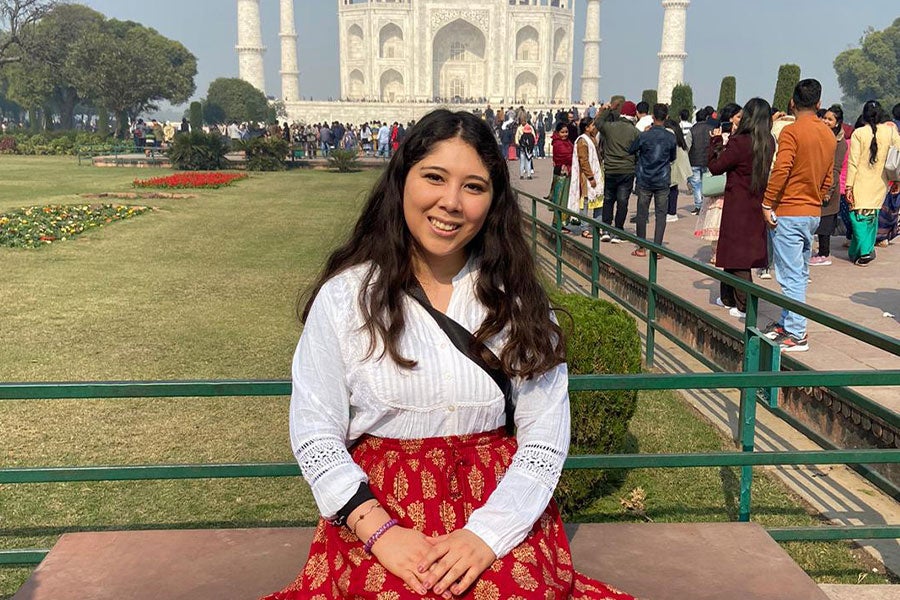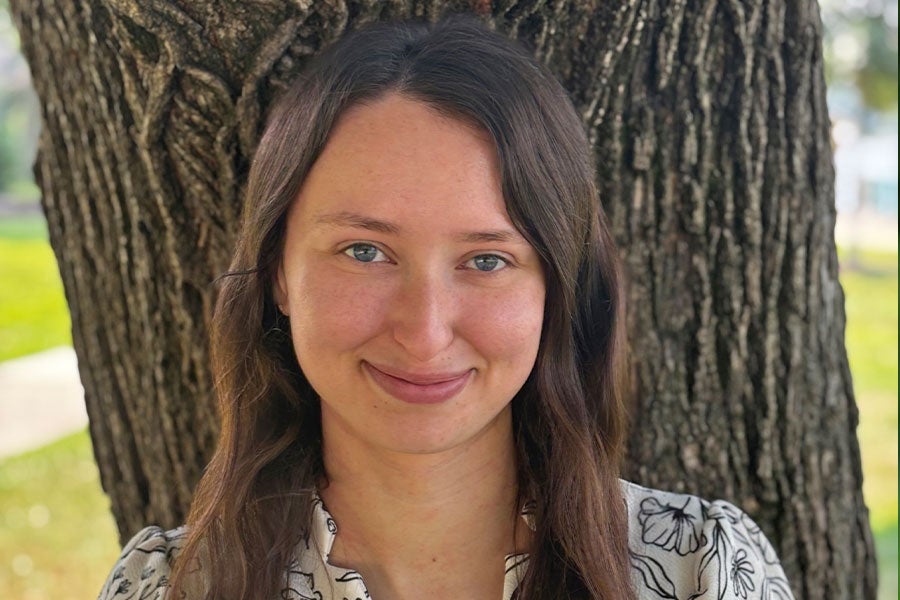Serving the Common Good as a Global Health Grad
This fall marks the five-year anniversary of Luther’s global health major. It was introduced in 2020, and students since the class of 2022 have been able to graduate with the major. By now, the college has seen about two dozen global health grads, all focused on improving health access, equity, and outcomes for their communities.
Program director Angela Kueny ’02, associate professor of nursing, explains that the global health curriculum focuses on systems—political, cultural, and social—that shape health at a population level. It teaches students to recognize challenges facing health systems, understand ways to measure and address them, and identify resources to find solutions. It also teaches them to recognize and address issues of inequity in healthcare. “This major answers the Luther College call to students to become global citizens and to serve the common good,” Kueny says.

As part of the global health major, Jocelyn Demiglio '24 (upper left, in mask) studied in Kabale, Uganda. Britt Fulton '24 (lower left, in red shorts) studied in Arica, Chile. On the right: Sidney Miller '24 (left), Lexi Hastings '23 (center), and Linnea Johnson Nordqvist '24 (right) spent time volunteering at Clinica Esperanza in Roatán, Honduras.
It’s no surprise that Luther students excel in this field. The handful of graduates you’ll read about here are leveraging their Luther educations in truly noble ways: to serve their neighbors; break down systemic barriers; use data, research, and analysis to improve healthcare; and work toward better outcomes for all.
Building Coalitions to Face Community Challenges
Kyra Kjeldahl ’22 started at Luther as a chemistry major, then changed to biology, but she couldn’t ignore her keen interest in anthropology, political science, and psychology. “When Luther started advertising the global health major, I was looking at the potential courses within it,” she says. “They were exactly the courses I wanted to take.” She liked that global health “wasn’t a limiting major. There were just so many different pathways. That was really appealing to me,” she says.

After graduating, Kyra worked at Horizon Public Health in central Minnesota, where she coordinated community-led substance misuse prevention. “We focused a lot on youth prevention and on building systems to reduce factors that might make young people more likely to use substances—adverse childhood experiences, like poverty, being unhoused, and other traumatic events,” she says. “Conversely, positive childhood experiences provide a kind of protective buffer. So that work was trying to reduce those root contributors to substance misuse and bolster some of the things that can help individuals with a history of those adverse childhood experiences.”
Since June, Kyra has worked in Virginia, Minn., for St. Louis County. She focuses on mental health promotion, suicide prevention, and food-access projects in communities from Duluth to the Canadian border. “My work involves coalition-building, so I’m working with community members to identify mental health challenges and community-based solutions,” she says.
Kyra finds working in local government rewarding because of how powerful it can be in making change. What she loves most, she says, is “being a facilitator for community change. There are a lot of great things already going on in my community. I love bringing that forward so more people know about it and then also being able to maybe fill some gaps.”
Patient Care and Education in a Culturally Meaningful Context
When Allegra Garcia ’23 saw a poster in the Union about the global health major, she says, “It talked about community-based work—putting yourself out there and helping to bridge gaps and disparities. Seeing a little bit of that growing up, hearing my own parents’ and grandparents’ stories, some as immigrants and children of immigrants, it just felt like the right call for me.”

A study-away practicum in Dehradun, India, allowed her to work in a rural community clinic and gain exposure to complementary and alternative medicine. “It was cool to see how these different systems operated under the umbrella of what it means to do medicine in India,” she says. “It was super eye-opening to see how they didn’t just address the diabetes or the heart condition—the physical health—but also looked at systemic issues like race, gender, and class.”
A second off-campus experience as an intern at a Mayo Clinic nonprofit in Rochester, Minn., gave her insight into community-based participatory research—specifically looking at high rates of diabetes, heart conditions, and obesity in immigrant communities. She also contributed to a project that captures Hispanic people’s cancer stories in order to spread awareness about the need for cancer screening.
After a stint in AmeriCorps, Allegra now works in harm reduction as part of a Native-based recovery program at the Native American Community Clinic in Minneapolis, where she teaches classes and also counsels clients one-on-one. The clinic is rooted in the culture and traditions of the people it serves, and its approach to healthcare includes addressing root causes of health disparities, like access to food, housing, and insurance.
A highlight of her work is seeing clients graduate from their recovery programs. Allegra says, “Sometimes they’re as old as 57, 60, and they’re starting the recovery journey or different phases of the recovery journey. To see them get those years of life back after that is amazing.”
With a legacy of nursing in her family, Allegra also feels the pull. This fall, she starts nursing school—while continuing to work full time—at Concordia University in St. Paul, Minn.
A Grad Student Super-Sleuth Curbing Foodborne Illness
When Britt Fulton ’24 took Global Health 101, there was a blurb in one of her textbooks about the Epidemic Intelligence Service, a CDC program that trains “disease detectives” to investigate and respond to public health challenges and emergencies. “I remember seeing that and thinking that is what I want to do,” she says.

The biology aspect of global health appealed to Britt. She had an impactful lab experience researching potential antibiotics from soil samples. She’s also grateful for a biostatistics class she took, which helped prepare her for her current life as a graduate student in the University of Minnesota’s School of Public Health, where she’s focused on epidemiology. She’s specifically interested in infectious disease as it relates to health equity and environmental exposures.
Alongside her studies, Britt works part-time in the Minnesota Department of Health’s foodborne disease unit. When a patient tests positive with a reportable illness, Britt is one of the people who reaches out for a follow-up interview about the patient’s symptoms and exposures. “Then we’re able to use that information to monitor the trends of the diseases and detect outbreaks,” she says.
With cuts to government funding and health research, Britt says, “It’s definitely a tough time for opportunities in public health, which is stressful, but I hope to end up working in the public sector of public health, ideally at a government agency.”
Luther’s First 4+1 Grad Supports Vital Programs through Research
As a high school student, Jocelyn Demiglio ’24 was laser-focused. “I did everything I could to make sure I went to college. It was important because I would be the first one in my family—first-generation,” she says. With a particular interest in science, she took all four AP science courses her high school offered—and graduated at the top of her class.

Jocelyn had planned on a career as a medical practitioner, but when she took her first global health class, it changed her trajectory. She decided on a global health and chemistry double major because, she says, “I wanted to solve problems for a community and not just focus on an individual.” While at Luther, Jocelyn completed a nine-week study-abroad experience in Kabale, Uganda, which further cemented her passion for global health.
In spring 2023, Luther announced a 4+1 Bachelor’s to Master’s Degree Program allowing Luther students to earn a bachelor’s degree plus a master’s degree at the University of Iowa College of Public Health in just five years. Jocelyn was the program’s first graduate. “While it was in progress, I was constantly asking for updates,” she recalls. “I think I applied to the program even before it was publicly announced!”
At the University of Iowa, Jocelyn focused on epidemiology because it felt to her like the bridge between chemistry and global health. She flourished in her program, earning a first place team finish in the school’s 2025 Global Health Case Competition.
The Monday after she graduated last May, Jocelyn started full time as a research associate at the University of Iowa’s Addiction and Recovery Collaborative. There, she writes and evaluates grant proposals. To date she has contributed to four, two of which have been funded.
In her role, Jocelyn crosses paths with many sectors of public health, from infectious disease and substance misuse to the justice system, maternal health, and more. “I like that my role is flexible and broad,” she says. “And I may not see many patients, but my work contributes to their health because it assures that patient-facing programs are able to run smoothly and achieve their goals.”
Longer term, Jocelyn hopes to earn a PhD focused on tropical disease detection or treatment research.
Analyzing Data to Improve Healthcare Access and Equity
Sidney Miller ’24 began at Luther already knowing that she’d major in global health. Once here, she valued the interdisciplinary nature of the program. She cites as especially formative an English course on medicine and disability in which she read things like Virginia Woolf’s Mrs. Dalloway, Timothy Snyder’s Our Malady, and Susan Sontag’s “Illness as Metaphor.”

The class also included personal writing to analyze aspects of the medical system that touched students’ own lives. “I wrote a piece on my grandmother and shared it with my family, and that was really impactful,” she says. “It was a hard thing to write, but it was kind of beautiful to contemplate the medical discipline within my life. A lot of our global health courses centered around the big picture, and narrowing it down to the individual and their feelings gives people the ability to empathize with the issue at hand.”
Sidney studied away in Costa Rica and in Roatán, Honduras, where she volunteered with a community clinic delivering hygiene products and medicines to lower-income areas. She also helped enter four months of backlog into the clinic’s diabetes database.
Since graduating in January 2024, Sidney’s been working at Emplify Health in La Crosse, Wis., first as an intern and now as a data analyst with its Patient Access Strategic Work Team. This new group uses technology to streamline patient experience and access across the system and ultimately to ensure better outcomes for patient care. If there are social determinants of health that prohibit patients from receiving care, Sidney’s team finds ways to connect them with resources.
The work is highly strategic and involves a lot of contact with senior leadership. Sidney is quite junior for the role, but her passion for the field impressed her hiring team. She explains, “I told them about my trip to Roatán and my studies and what I believe in, and they said, ‘Well, you’re not the most experienced person in analysis, aside from a couple of data and analytics internships, but since you’re so passionate about the subject, we’d love to have you on our team.’”
It’s been a great match. “It’s very cool that I fit into this niche that coincides with those global health principles of increasing accessibility and health equity and evaluating social determinants of health,” she says. “It’s really interesting to work in that intersection. I found a great position.”